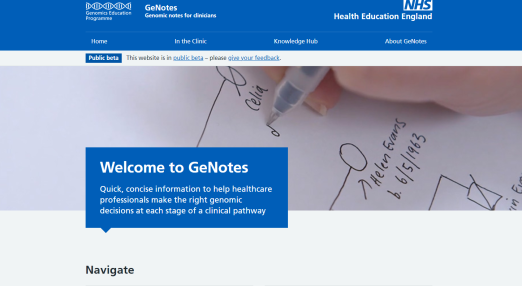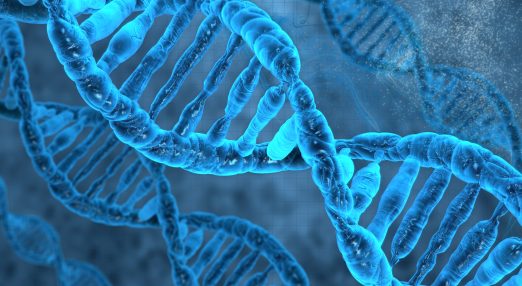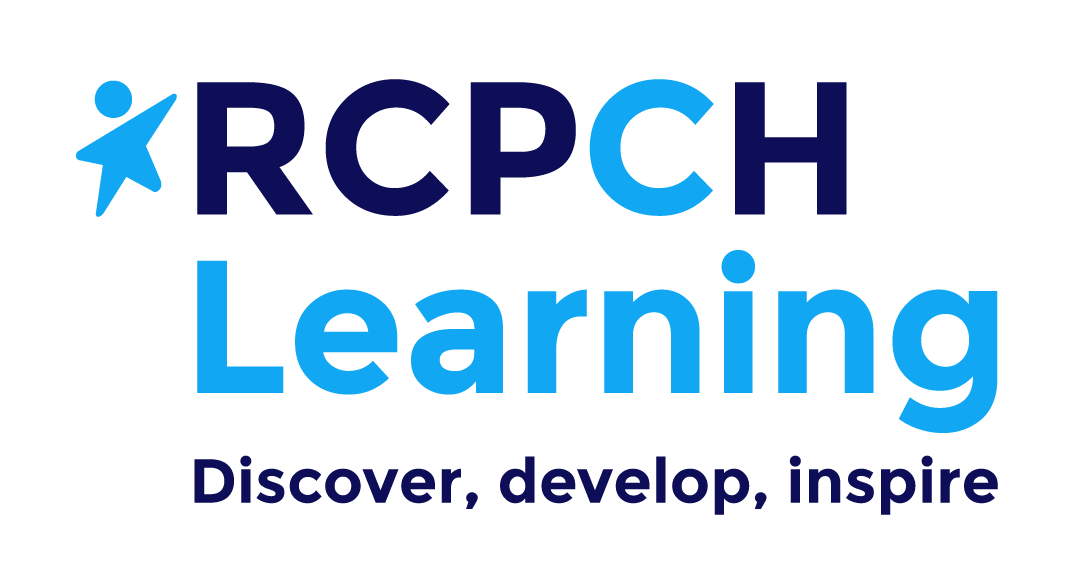Length
4.5 hours in total
Target Audiences
- Paediatricians and those who want to learn more about genomics within paediatrics
Self paced
Work through the module at your own pace.When you have completed the module, you can return at any time to re-review any of the sections.
Free
Log in with your account
About this course
Overview
The Study Day on Applications of Genomics in Paediatrics was held as an in-person event in June. The day explored current approaches and best practice in paediatric genomic medicine covering practical tips for paediatricians, resources for undertaking genomics in paediatric clinics and exploring the future of genomic medicine.
This page has been provided as a platform for interested viewers to view the content (talks and workshops) from the day to enhance learning around genomics and its application to paediatrics.
How to use this page
You will find the course content below. This Applications of Genomics in Paediatrics page has 14 steps:
1-12) Workshop videos
13) Useful resources
14) The post-course evaluation form
Once you have completed each section, click the ‘Mark complete‘ button.
Next, complete and submit the post-course evaluation form, and click the ‘Mark complete‘ button
Once all steps have been completed, a downloadable certificate of completion will be issued on the page.
If you have any questions, please contact the RCPCH Learning team
Fundamental Principles of Genomics
Professor Kate Tatton-Brown
Duration: 39 minutes
Summary: The talk will introduce you to the fundamental principles of genomics, explaining why we are interested in genomics and how genomics is transforming clinical practice.
The Application of Genomics in Healthcare
Dr Frances Elmslie
Duration: 34 minutes
Summary: The talk will outline the current position of Genomics in the healthcare landscape and discuss the challenges and successes of the new Genomic Medicine Service in England.
What Does Genomics Mean for Paediatrics?
Dr Eleanor Hay
Duration: 23 minutes
Summary: The talk will focus on the implications of Genomics for paediatrics. 75% of rare diseases present in childhood and preventing large ‘diagnostic odysseys’ can be hugely beneficial for families. We will look at how paediatricians can facilitate diagnosis by instigating initial genetic testing and how liaising with clinical genetics teams can enable broader testing, variant review, or more urgent analysis (R14). We will also touch upon the impact of genomics for guiding management in children, through specific gene therapy, paediatric tumour analysis and the newborn genome sequencing project (The Generation Study).
R14
Dr Hayley Lees & Ana Juett
Duration: 27 minutes
Summary: An introduction to the R14 pathway and when to use it.
Personal Experience of Using Genomics in Paediatrics
Dr Richard Hastings
Duration: 18 minutes
Summary: Dr Richard Hastings will talk about his own journey to becoming a ‘genomic advisor’, including how he has have forged links with the local clinical genetics team and his approach to support colleagues with genomic testing within the local hospital.
Workshop 1: Application of Genomics in Paediatrics
Dr Sharon Jheeta, Dr Richard Hastings & Dr Lara Menzies
Duration: 33 minutes
Summary: The workshop will use case presentations to demonstrate when a paediatrician should be considering genetic testing for their patient; considering aspects such as arranging testing, what to do with the results, and how to liaise with your local clinical genetics service.
Tips for arranging genetic testing
Dr Sharon Jheeta, Dr Richard Hastings and Dr Lara Menzies
Duration: 16 minutes
Summary: The panel share tips on consent regarding genetic testing and advise around when to liaise with your local clinical genetics team
Introduction to the GEP and the Education for Paediatrics
Professor Kate Tatton-Brown
Duration: 17 minutes
Summary: This talk will cover the resources that the Genomics Education Programme within NHS England have developed to support clinicians to upskill in genomics.
Deep Dive into GeNotes
Dr Eleanor Hay
Duration: 19 minutes
Summary: GeNotes was devised to provide rapid, concise information to help healthcare professionals make the right genomic decisions at each stage of a clinical pathway. This talk gives a run-through of how the resource is used in practice, both at the point of care and in extending learning to upskill our genomics workforce.
Workshop 2: What Else Needs to be Developed? Where are the Gaps?
Dr David Wright, Dr Ed Steel, Dr Chinthika Piyasena & Dr Eleanor Hay
Duration: 24 minutes
Summary: This workshop focuses on the future of the field of paediatric genetics, including discussions on the next steps for development and where there is room for improvement.
Case Study
Dr Louise Hartley
Duration: 30 minutes
Summary: Since 2021, three new genetic therapies have been available to treat spinal muscular atrophy, the most common genetic neuromuscular disease of childhood. Dr Louise Hartley will present a case of type 1 SMA treated with an antisense oligonucleotide and viral vector gene therapy, and explain the rational and mode of action of these new treatments
Professor Kate Tatton-Brown
Clinical Director and Head of National Genomic Education; NHS England
Kate Tatton-Brown is clinical director and head of the Genomics Education Programme within NHS England; a consultant clinical geneticist at St George’s University Hospitals NHS Foundation Trust and a Professor of clinical genetics and genomic education at St George’s, University of London. She studied medicine at the University of Oxford before training first in paediatrics and then in clinical genetics. Kate is passionate about upskilling the healthcare workforce to embrace genomics and use genomic data to transform patient management. She is a national leader in genomic education and has been directing the development of a portfolio of “just in time” (reactive) and “just in case” (proactive) online, in-person and blended educational resources. The portfolio includes the Genomics Training Academy (GTAC); GeNotes; several Massive Open Online Courses (MOOCs); a framework to support the development of genomic champions/advisors; a new approach to the integration of genomic medicine through the Clinical Pathway Initiative (CPI) and several postgraduate genomic courses. In addition to her education and NHS clinical roles, Kate has a keen interest in research. She has been researching a family of conditions characterised by increased growth and an intellectual disability (the OGID syndromes) for over two decades and has published widely in this area.

Dr Eleanor Hay
Clinical Genetics Consultant; Great Ormond Street Hospital
Dr Hay is a genetics consultant at Great Ormond Street Hospital, specialising in paediatric rare disease and genetic eye conditions. In addition, she is integrated into the UK retinoblastoma service (London), where she sees families for genetic testing and counselling. She is a member of the Childhood Eye Cancer Trust (CHECT) Specialist Advisory Board.
Dr Hay has a background in paediatric medicine and completed her clinical genetics training at St Georges/Great Ormond Street Hospitals. She is a council member of the UK Clinical Genetics Society, co-chair of the RCPCH Genomics Working Group and co-chair of the NHSE Genomics Education Programme Paediatric working group.

Dr Chinthika Piyasena
Consultant Neonatologist; Guys’ and St Thomas’ NHS Foundation Trust
Chinthika is a consultant neonatologist at Evelina London. She enjoys all aspects of neonatology but has recently been interested in advanced genomics, with its prospect of accurate diagnoses for newborn infants. She was the PI for The Next Generation Children’s Study, and currently is the PI for the Newborn Genomes Program for Evelina London. Her PhD in epigenetic mechanisms of early life programming in preterm infants provided a foundation. She is part of the GeNotes education program and member of the RCPCH Genomics Working Group.

Dr Frances Elmslie
Consultant Clinical Geneticist, Clinical Director, South East Genomic Medicine Service Alliance; St George’s University Hospitals
Dr Elmslie is the clinical lead for South West Thames Centre for Genomics based at St George’s as well as Clinical Director of the South East Genomic Medicine Service Alliance. In this capacity, she leads a team that aims to embed genomics into routine patient care across South East England. She has held a number of senior management positions including Chair of the Clinical Reference Group for Genetics at NHS England from 2017 – 2020 and President of the Clinical Genetics Society from 2019 – 2021.
She leads the St George’s Tuberous Sclerosis Complex (TSC) clinic, the largest such clinic in the UK. Dr Elmslie is the clinical lead for the NHSE TSC Rare Disease Collaborative Network for TSC. She was invited to take up the role of Chair of the patient charity, the Tuberous Sclerosis Association, in December 2023. Dr Elmslie is a Co-Investigator for the NIHR/MRC funded Rare Disease Node in mTOR pathway disorders.

Dr David Wright
Consultant Paediatrician; Stockport NHS Foundation Trust
David is a general paediatric consultant with expertise in Cardiology in a DGH. David got involved in genomic work through a Masters in Ethics and Law where I became interested in balancing the interests of patients and the interests of their families in knowing, or not knowing, genetic information. David is a member of Alder Hey’s Ethics committee and a tutor for Ethics and Law at Manchester University medical school.

Dr Hayley Lees
Clinical Scientist; Royal Devon and Exeter Hospital NHSClinical Lecturer in Paediatrics
Hayley Lees is a Clinical Scientist in the Exeter Genomics Laboratory (EGL), providing rapid genome sequencing for acutely unwell babies and children with a likely monogenic disorder.
Hayley has also been involved in research activities further analysing 100,000 Genomes Project data from families recruited to the South West rare disease arm, in whom a genetic diagnosis was not identified during the primary analysis phase. Prior to joining EGL, she completed the Scientist Training Programme (STP) at Bristol Genomics Laboratory (South West GLH) and a DPhil in Biochemistry at the University of Oxford.
Dr Louise Hartley
Consultant Paediatric Neurologist; Royal London Hospital
Louise has worked as a paediatric neurologist at the Royal London Hospital since 2018, prior to this from 2003-2017, Louise ran the neuromuscular service for south Wales based at the University Hospital of Wales, Cardiff.

Dr Lara Menzies
Consultant in Clinical Genetics and Genomic Medicine; Great Ormond Street Hospital
Lara is a Consultant in Clinical Genetics and Genomic Medicine at Great Ormond Street Hospital, London and an Honorary Associate Professor at University College London. She has a special interest in Neurogenetics. Prior to specialising in Genetics, Lara trained as a Paediatrician and completed a PhD at the University of Cambridge which was awarded a British Neuroscience Association prize. Lara has has published widely and her research has been cited >5000 times.
Lara has a keen interest in medical education and teaches regularly on Genomics. She has worked closely with charities such as Unique and Medics4RareDiseases to translate research findings into meaningful information for families and was awarded an RCPath 2020 Silver Research Medal.

Dr Ed Miller
Education Specialist; NHSE’s Genomics Education Programme
Dr Ed Miller is an Education Specialist for NHS England’s National Genomics Education Programme which exists to deliver learning and development opportunities to both healthcare professionals involved in NHS Genomics Medicine service and the wider workforce.
Ed provides educational steer and input across the programme and leads a number of projects to support the education and training of healthcare professionals in genomics across professions and specialties.
Before joining the Genomics Education Programme, Ed researched DNA damage repair and replication and has a PhD from the University of Birmingham.
Dr Ed Steel
Clinical Genetics Registrar; North West Thames Genetics
Ed is a Clinical Genetics trainee based in North West London and a former Paediatrics trainee. Ed has a particular interest in genetic diseases presenting the neonatal period or early infancy.

Ana Juett
Programme Manager; South West NHS Genomic Medicine Service Alliance
Ana is the Programme Manager for the South West NHS Genomic Medicine Service Alliance. She has a background in NHS project management and change analysis in both clinical, and research, service delivery. Ana has a passion for patient involvement and worked as a PPI lead on both regional and national projects for the clinical research network before moving to the 100,000 Genomes Project in 2016, where she was South West Genomic Medicine Centre Programme Lead for both Rare Disease and Cancer. Ana is dedicated to supporting the work of the South West Genomic Laboratories in order to realise the potential of genomic medicine for all NHS patients and their families.

Dr Richard Hastings
Consultant Paediatrician; Sherwood Forest Hospitals
Richard is a consultant general paediatrician at King’s Mill Hospital in Nottinghamshire. He is also the head of service for acute paediatrics and divisional digital clinical lead. Richard has a special interest in genomic medicine and is a member of the RCPCH Genomics Working Group.
Lara has a keen interest in medical education and teaches regularly on Genomics. She has worked closely with charities such as Unique and Medics4RareDiseases to translate research findings into meaningful information for families and was awarded an RCPath 2020 Silver Research Medal.
Dr Sharon Jheeta
Consultant Paediatrician; Imperial College NHS Trust
Sharon is a consultant paediatrician at Imperial College NHS Trust. She has an interest in paediatric neurology and now in genomic testing for rare diseases. She sits on the RCPCH Genomics Working Group.
Ed provides educational steer and input across the programme and leads a number of projects to support the education and training of healthcare professionals in genomics across professions and specialties.
Before joining the Genomics Education Programme, Ed researched DNA damage repair and replication and has a PhD from the University of Birmingham.
As of 1st September 2016 the Revalidation and CPD team of the Royal College of Paediatrics and Child Health no longer allocates a number CPD credits to courses or events. The removal of credits associated with events allows delegates to record the educational benefit of the activity through written reflection, in contrast to quantifying the significance based on the time duration of the course. This is in accordance with changes made to the CPD Scheme guidelines published in April 2016.
Detailed information and scheme guidance can be found on the RCPCH website
When recording the activity, delegates should focus on the reflection and detail the following:
- What did you learn?
- What effect has/will the learning had/have on your current practice?
- What further learning or action, if any, is needed as a result of the original learning activity?
Should you have any questions regarding the removal of credits, please feel free to contact the CPD team
If you use the RCPCH CPD Diary, you can click here to visit the diary and record your learning: Log your learning on the RCPCH CPD Diary
Related resources
-

RCPCH Webinar: Paediatric GeNotes: Facilitating genomics mainstreaming for paediatric clinicians
In this webinar, Professor Kate Tatton-Brown and Dr Eleanor Hay present the exciting new GeNotes online platform, which launches this May 2023. GeNotes is designed to support clinicians in gaining confidence and competence in genomic practice.

Whole genome sequencing: developments and future perspectives
On 20 January 2023 we hosted a webinar discussion with Genomics England to hear the most recent updates and the future perspectives in paediatric genomics. You can watch the recording and read our speakers' responses to questions posed by delegates during the event.
Found an issue? Please get in touch with us:
Email us at rcpchlearning@rcpch.ac.uk
